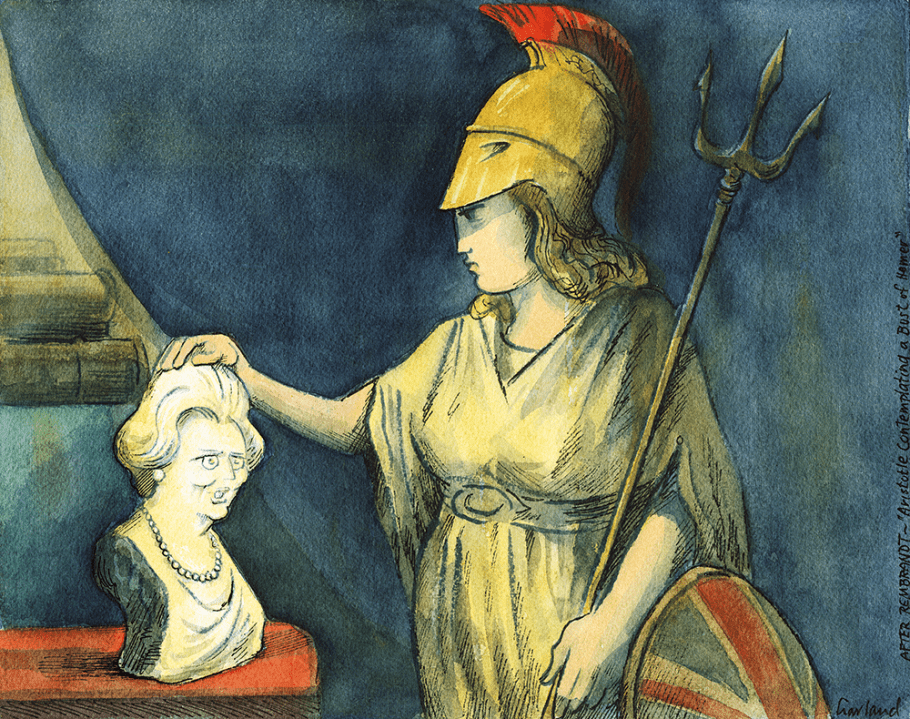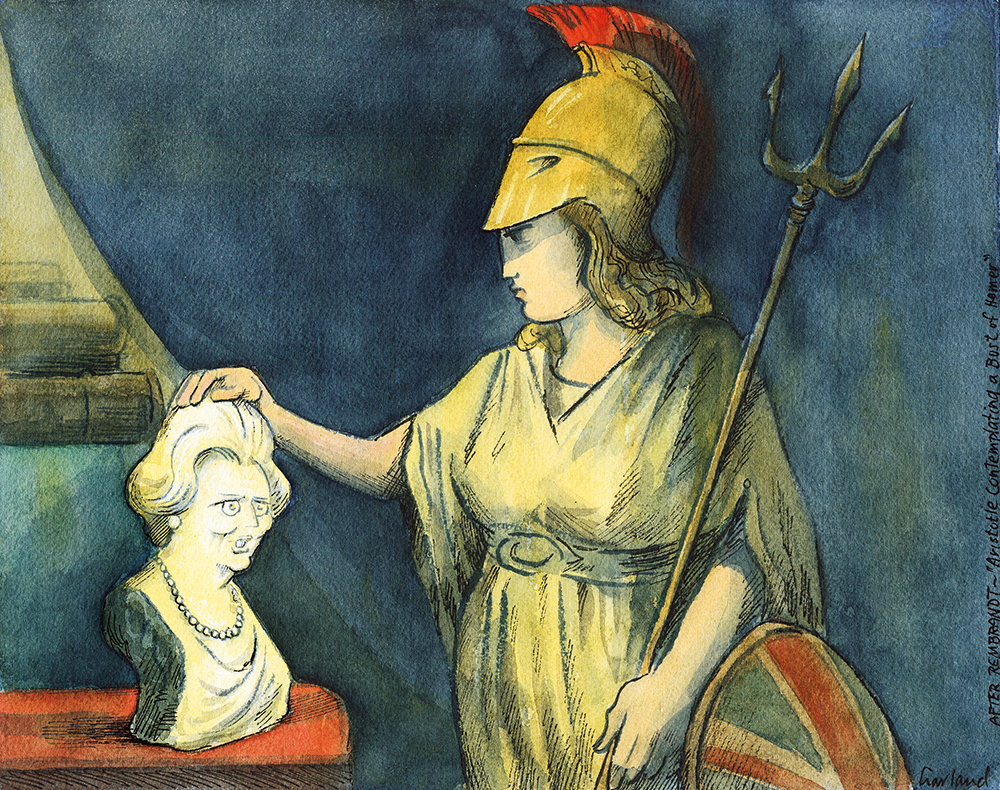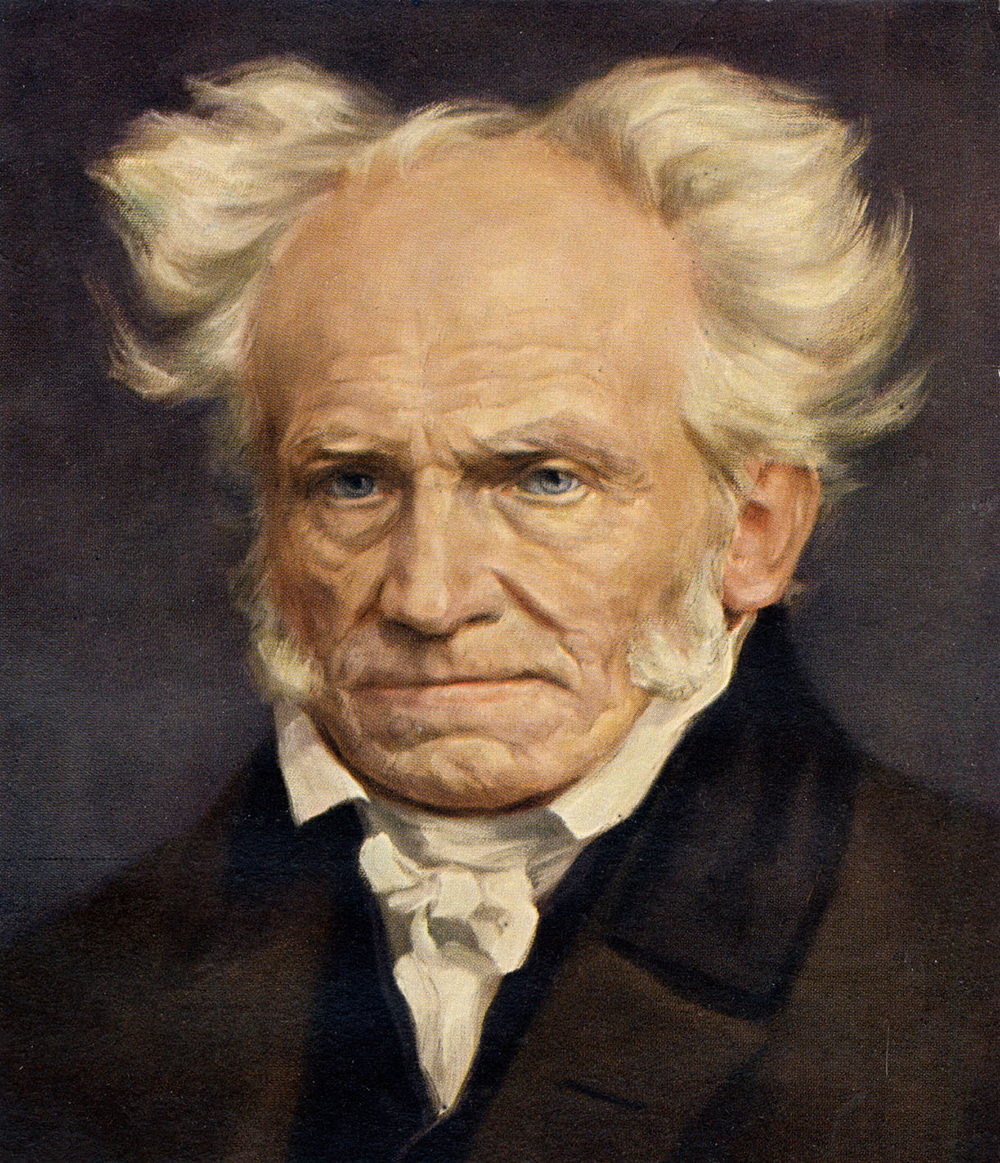
William Atkinson has narrated this article for you to listen to.
Like every Tory Boy, I had a Margaret Thatcher poster. I put it up when I was 15 and had just joined the party. Above my bed, resplendent in blue, the Iron Lady glowered down at my teddies. Naturally, it came down when I first brought home a girlfriend.
For any young Tories lacking in Thatcher tat, this week’s Conservative party conference will provide plenty of opportunities for purchasing some. It (almost) coincides with the 100th anniversary of Thatcher’s birth on 13 October. The occasion has been heralded by a series of think-tank initiatives, dinners and conferences and the release of a one-volume edition of Charles Moore’s biography. The Iron Lady’s spectre looms as large as ever over this conference. Many of today’s Conservatives remain in hock to her. Every promising female Tory is inevitably – often embarrassingly – compared to her.
Such veneration isn’t surprising. Past glories are comforting and the current Tory position is bleak: a year on from a record defeat, battling to stay out of fourth position in the polls, pushed into irrelevance by Nigel Farage, and with no clear purpose, message or direction, despite – or because of – Kemi Badenoch’s best efforts. Why wouldn’t Tories want to hold on to the memory of one of their greatest leaders?
And, in case there’s any doubt, reading Moore’s book reminds one just how extraordinary Thatcher’s achievements were. Three election victories, inflation tamed, the Falklands recaptured, council houses sold, unions curbed, state-run industries privatised, the City liberated, and national decline reversed. Her various successors look like pygmies by comparison. If a Thatcher poster is a passion-killer, having one of John Major or Theresa May is grounds for sectioning.
Yet even we long-term devotees (my father played the audiobook of The Downing Street Years on my school run, only stopping after I started lecturing my teachers about going on strike) have to admit that the Conservatives’ continuing fealty to the Thatcher cult is a problem. Celebrating her record is all well and good. But the Tories’ tendency to ask ‘What would Maggie do?’ gives them a convenient excuse to stop thinking. For them, Thatcher has mutated from a historical figure into a blunt test of doctrinal fidelity.
At best, this beatification makes for a few lazy opinion pieces of the ‘If Mrs T. had lived today, of course she would have left the ECHR/ kept the triple lock/ sacked Ruben Amorim’ variety. At worst, it prevents the party from developing a coherent response to the very different challenges Britain faces today. See: the disastrous elevation of Liz Truss, the Tories’ most hapless prime minister, on the basis she excited a few ageing party members with fantasies of Maggie 2.0.
The Tories’ tendency to ask ‘What would Maggie do?’ gives them a convenient excuse to stop thinking
There are two Thatchers: the pragmatist she governed as, and the ideologue admirers promoted after her defenestration. The Thatcher who hiked taxes in the 1981 Budget and bought off the miners until coal stocks were sufficient is forgotten in favour of a tax-cutting, Soviet-stomping Gloriana – Ronald Reagan in drag. Truss’s mini-Budget was the endpoint of 30 years of cross-Atlantic libertarians reducing her record to tax cuts alone.
Some of the challenges Thatcher confronted have obvious parallels to today: intractable inflation, unruly trade unions, stult-ifying socialism. But the circumstances of the 2020s are vastly different. In the 1970s and 1980s, Britain was a country of net emigration, with North Sea oil coming on stream. Today, we have become accustomed – thanks, Boris! – to immigration in the hundreds of thousands, alongside the West’s highest energy costs. Yes, like today’s wannabe reformers, Thatcher faced considerable Whitehall resistance. But she did not face the same thicket of civil service inertia, judicial interference, international agreements and quangocratic muddle that have stifled ministers in recent years.
The Tories must learn from Thatcher’s methods, rather than bow to an idealised version of her. Badenoch seems to grasp this in a way that Truss did not. Her team have reportedly looked at Stepping Stones: a plan for government the businessman John Hoskyns created for Thatcher, which provided an integrated picture of Britain’s decline and a strategy for reversing it. Rather than embracing a parody version of Thatcher’s agenda, they are following her process of first producing a detailed diagnosis of Britain’s problems before deciding policy. But the party’s history encompasses more than just 1975 to 1990. There are plenty of other Ghosts of Tories Past to go to for guidance: Harold Macmillan’s housebuilding boom or Neville Chamberlain’s passion for social reform.
In particular, younger right-wingers, appalled by recent record immigration levels, are taking a renewed interest in Enoch Powell. Thatcher’s triumphs were built on a strong nation state, which Britain cannot be if it is increasingly stratified along ethnic or religious lines. To a new generation, perhaps tempted to vote for Reform UK, Powell appears more of a prophet than a pariah.
As Katie Lam – the latest Tory starlet tarnished with the Thatcher Recidivus tag – recently pointed out, Thatcher left office before the coming generation of Conservatives was born. ‘You can learn lessons from history books,’ she said, ‘but they can’t tell you what to do.’ The best 100th birthday present the party can offer Thatcher is to celebrate her achievements, present her record honestly, and finally move on.
Does the cult of Thatcher need to die? Tim Shipman, Philip Hensher and Lara Brown join William Moore on the most recent Edition podcast:










Comments